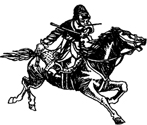
ROUND about the year 1890, the hero of an early novel by John Buchan finally redeemed the failures of an otherwise unsatisfactory life by repulsing single-handed a sizeable Russian army which he found, while on a shooting expedition, in the act of invading India. He did it with a sporting rifle and with a conveniently placed boulder which at the critical moment he toppled down on the intruders.
At about the same time, Kipling’s Man Who Was crawled out of Central Asia and into the mess of his old regiment, the White Hussars, who happened to be stationed somewhere near the Khyber Pass. He had been so roughly handled over the past thirty years by some Russians, whose Colonel he had insulted, and more recently by the outposts of the White Hussars, who had unfortunately mistaken him for an Afghan, that he died three days later. But not before the circumstances of his brief reappearance had revealed in his true colours the apparently charming Cossack officer who happened to be visiting the White Hussars at the time and had also served to remind that dashing regiment that a couple of hundred miles to the north of the Khyber was an enemy worthier of their steel than the unruly tribesmen who periodically sniped at them from the neighbouring hilltops.
And then, of course, there was Kim, whose real name was Kimball O’Hara, and who at the age of seventeen managed, with his friend the Guru, completely to upset the plans of the Tsar’s Intelligence Service.
But it was not only in the realms of romantic fiction that such characters had their being. They really existed. Even the invading Russian army was a reality, though the boulder that finally checked its progress was a diplomatic one.
For the greater part of the nineteenth century, and after it, up and down the length and breadth of Central Asia, from the Caspian to the Karakoram and from the Khyber Pass to the confines of Siberia, throughout the whole of the vast, but rapidly narrowing Tom Tiddler’s Ground that separated their respective Empires, Englishmen and Russians, and men of other races and nationalities too, played what they and their contemporaries called The Great Game. Played it from various motives and with varying degrees of success. Played it, on the whole, with courage and resourcefulness, with dash and initiative, and with no great attention to any particular set of rules.
For a space, the attention of the world was focused on Central Asia. Men risked their lives to get there. Not many succeeded and not all of them returned to tell the tale. But, between them, both figuratively and literally, they put Central Asia on the map.
And then a strange thing happened. As the spheres of influence crystallized and the tension between Great Britain and Russia subsided, people forgot about Turkestan. Today, it is by no means everyone who knows where to look for Merv or Bokhara or is even sure to what country they now belong. And the men who for one reason or another once risked their lives to reach them have for the most part been forgotten too.
Because this seemed to me a pity, I conceived the idea of writing a book about some of them. The result is not a serious work of scholarship. Though it contains, it is true, the results of a certain amount of original research, much of what I have written has already been told. Much was known, seventy or eighty years ago, to every schoolboy. But I have enjoyed writing it and for my part I shall be content if I help to revive memories of some men who deserve to be remembered and at the same time manage to give my readers some idea of the regions to which they travelled, of the times in which they lived and of the restless, adventurous spirit that drove them on.
